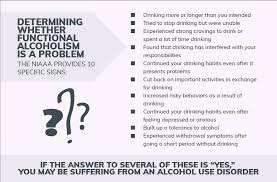The Reality of Functioning Alcoholism
Alcoholism is a complex and often misunderstood condition that can manifest in various ways. One such manifestation is known as functioning alcoholism. This term refers to individuals who are able to maintain their daily responsibilities and outward appearance of normalcy while struggling with alcohol addiction behind the scenes.
Functioning alcoholics may hold down successful jobs, have stable relationships, and appear to have their lives together on the surface. However, beneath this facade lies a dependence on alcohol that can have serious consequences for their health and well-being.
One of the dangers of functioning alcoholism is that it can be easily overlooked or dismissed by both the individual themselves and those around them. Since they are able to manage their external obligations, they may deny or downplay the severity of their drinking problem, leading to delayed intervention and treatment.
Despite appearing functional, individuals struggling with alcoholism face a range of physical, mental, and emotional challenges. Excessive alcohol consumption can take a toll on various organs in the body, leading to liver damage, heart problems, and an increased risk of certain cancers. It can also contribute to mental health issues such as depression and anxiety.
Furthermore, functioning alcoholism can impact personal relationships and professional performance over time. The reliance on alcohol as a coping mechanism can strain interactions with loved ones and hinder one’s ability to perform optimally at work or in other areas of life.
Recognizing the signs of functioning alcoholism is crucial in order to provide support and encourage treatment for those affected. It’s important to look beyond outward appearances and pay attention to changes in behavior, mood swings, secretive drinking habits, and an increasing tolerance for alcohol.
If you or someone you know is struggling with functioning alcoholism, reaching out for help is the first step towards recovery. Treatment options such as therapy, support groups, and medical interventions can provide the necessary tools for overcoming alcohol addiction and reclaiming control over one’s life.
Remember, functioning alcoholism is a serious condition that requires attention and intervention. By acknowledging the problem and seeking help proactively, individuals can embark on a path towards healing and long-term sobriety.
Understanding Functioning Alcoholism: FAQs and Insights
- What is a functioning alcoholic?
- How can you identify a functioning alcoholic?
- What are the signs and symptoms of functioning alcoholism?
- Can functioning alcoholics maintain their daily responsibilities?
- What are the risks of being a functioning alcoholic?
- How does functioning alcoholism affect relationships?
- Is it possible for a functioning alcoholic to seek help and recover?
- What treatment options are available for functioning alcoholics?
- How can family and friends support someone struggling with functioning alcoholism?
What is a functioning alcoholic?
A functioning alcoholic is an individual who is able to maintain their daily responsibilities and obligations while struggling with alcohol addiction. Despite appearing outwardly successful and in control, a functioning alcoholic relies on alcohol to cope with stress, emotions, or other challenges in their life. This type of alcoholism can often go unnoticed or minimized due to the individual’s ability to hide their drinking habits and maintain a facade of normalcy. However, behind this facade lies a serious dependency on alcohol that can have detrimental effects on their physical health, mental well-being, relationships, and overall quality of life.
How can you identify a functioning alcoholic?
Identifying a functioning alcoholic can be challenging as they often excel at concealing their alcohol dependency behind a facade of normalcy. Some common signs to look out for include maintaining high levels of productivity despite frequent alcohol consumption, consistently downplaying the amount or frequency of their drinking, exhibiting irritability or defensiveness when questioned about their alcohol intake, and relying on alcohol to cope with stress or emotions. Additionally, noticing subtle changes in behavior, such as increased isolation or secretive drinking habits, can also be indicators of functioning alcoholism. It’s important to approach the situation with empathy and understanding while encouraging open communication and seeking professional help if needed.
What are the signs and symptoms of functioning alcoholism?
Recognizing the signs and symptoms of functioning alcoholism is crucial in identifying and addressing this complex condition. Individuals struggling with functioning alcoholism may exhibit subtle yet telling behaviors, such as consistently drinking alone, hiding or downplaying their alcohol consumption, experiencing frequent mood swings or irritability, developing a high tolerance for alcohol, prioritizing drinking over other activities, and denying or minimizing the impact of their drinking on their health and relationships. Additionally, physical signs like weight gain or loss, changes in appearance, and memory lapses can also indicate a problem with alcohol. It’s important to be aware of these signs and symptoms to offer support and encourage those affected to seek help and treatment for their alcohol addiction.
Can functioning alcoholics maintain their daily responsibilities?
Functioning alcoholics are often able to maintain their daily responsibilities despite struggling with alcohol addiction. They may appear to have their lives together on the surface, holding down successful jobs and managing relationships effectively. However, it’s important to recognize that while they may fulfill their external obligations, functioning alcoholics still face significant challenges behind the scenes. The ability to maintain daily responsibilities does not negate the harmful impact of alcoholism on their health, relationships, and overall well-being. Addressing the issue of functioning alcoholism requires understanding that outward appearances can be deceiving and that support and intervention are crucial for long-term recovery.
What are the risks of being a functioning alcoholic?
The risks of being a functioning alcoholic are significant and can have serious consequences on various aspects of one’s life. Despite appearing to handle daily responsibilities, individuals struggling with functioning alcoholism face health risks such as liver damage, heart problems, and an increased susceptibility to mental health issues like depression and anxiety. Moreover, the reliance on alcohol as a coping mechanism can strain personal relationships, hinder professional performance, and lead to social isolation. Delayed intervention and treatment for functioning alcoholism can exacerbate these risks, making it crucial to recognize the signs early and seek help to mitigate the potential negative outcomes associated with this condition.
How does functioning alcoholism affect relationships?
Functioning alcoholism can have a profound impact on relationships, often leading to strained dynamics and emotional turmoil. While individuals struggling with functioning alcoholism may appear to maintain their external responsibilities, their dependence on alcohol can erode trust, communication, and intimacy within personal connections. Loved ones may experience feelings of frustration, disappointment, and helplessness as they witness the harmful effects of alcohol on the individual’s behavior and well-being. The cycle of denial and secrecy common in functioning alcoholism can create barriers to open dialogue and mutual understanding, further complicating the relationship dynamics. Over time, untreated functioning alcoholism can lead to breakdowns in relationships, isolation, and a sense of disconnection between the individual and their loved ones.
Is it possible for a functioning alcoholic to seek help and recover?
For many individuals struggling with functioning alcoholism, the question of whether it is possible to seek help and recover is a common concern. The answer is a resounding yes – functioning alcoholics can absolutely seek help and embark on a journey towards recovery. While the facade of normalcy may make it challenging to acknowledge the problem, reaching out for support is a crucial first step. With the right treatment, therapy, and support systems in place, functioning alcoholics can address their addiction, learn healthier coping mechanisms, and work towards reclaiming control over their lives. Recovery is a challenging but achievable process that offers hope and the opportunity for a brighter, sober future.
What treatment options are available for functioning alcoholics?
When addressing the frequently asked question of “What treatment options are available for functioning alcoholics?” it’s important to highlight that there are various approaches to supporting individuals struggling with functioning alcoholism. Treatment options may include therapy, counseling, support groups such as Alcoholics Anonymous (AA), medication-assisted treatment, detox programs, and residential rehabilitation centers. These interventions aim to address the underlying causes of alcohol addiction, provide coping strategies for managing cravings and triggers, offer emotional support, and promote long-term recovery. Seeking professional help and personalized treatment plans tailored to the individual’s needs are key steps in effectively addressing functioning alcoholism and fostering a healthier lifestyle.
How can family and friends support someone struggling with functioning alcoholism?
Supporting someone struggling with functioning alcoholism can be challenging but crucial for their well-being. Family and friends can offer support by expressing concern in a non-judgmental manner, encouraging open communication about their struggles with alcohol, and helping them seek professional help or treatment options. Providing emotional support, participating in therapy sessions or support groups together, and setting boundaries to prevent enabling behaviors are also important ways to assist a loved one in overcoming functioning alcoholism. It’s essential to approach the situation with empathy, understanding, and patience while being firm about the need for change and seeking help.



